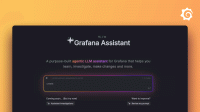Caution
Grafana Agent has reached End-of-Life (EOL) on November 1, 2025. Agent is no longer receiving vendor support and will no longer receive security or bug fixes. Current users of Agent Static mode, Agent Flow mode, and Agent Operator should proceed with migrating to Grafana Alloy. If you have already migrated to Alloy, no further action is required. Read more about why we recommend migrating to Grafana Alloy.
Important: This documentation is about an older version. It's relevant only to the release noted, many of the features and functions have been updated or replaced. Please view the current version.
otelcol.exporter.otlphttp
otelcol.exporter.otlphttp accepts telemetry data from other otelcol
components and writes them over the network using the OTLP HTTP protocol.
NOTE:
otelcol.exporter.otlphttpis a wrapper over the upstream OpenTelemetry Collectorotlphttpexporter. Bug reports or feature requests will be redirected to the upstream repository, if necessary.
Multiple otelcol.exporter.otlphttp components can be specified by giving them
different labels.
Usage
otelcol.exporter.otlphttp "LABEL" {
client {
endpoint = "HOST:PORT"
}
}Arguments
otelcol.exporter.otlphttp supports the following arguments:
The default value depends on the endpoint field set in the required client
block. If set, these arguments override the client.endpoint field for the
corresponding signal.
Blocks
The following blocks are supported inside the definition of
otelcol.exporter.otlphttp:
The > symbol indicates deeper levels of nesting. For example, client > tls
refers to a tls block defined inside a client block.
client block
The client block configures the HTTP client used by the component.
The following arguments are supported:
By default, requests are compressed with gzip. The compression argument
controls which compression mechanism to use. Supported strings are:
"gzip""zlib""deflate""snappy""zstd"
If compression is set to "none" or an empty string "", no compression is
used.
tls block
The tls block configures TLS settings used for the connection to the HTTP
server.
The following arguments are supported:
If the server doesn’t support TLS, the tls block must be provided with the
insecure argument set to true. To disable tls for connections to the
server, set the insecure argument to true.
sending_queue block
The sending_queue block configures an in-memory buffer of batches before data is sent
to the HTTP server.
The following arguments are supported:
When enabled is true, data is first written to an in-memory buffer before
sending it to the configured server. Batches sent to the component’s input
exported field are added to the buffer as long as the number of unsent batches
does not exceed the configured queue_size.
queue_size is used to determine how long an endpoint outage is tolerated for.
Assuming 100 requests/second, the default queue size 5000 provides about 50
seconds of outage tolerance. To calculate the correct value for queue_size,
multiply the average number of outgoing requests per second by the amount of
time in seconds that outages should be tolerated for.
The num_consumers argument controls how many readers read from the buffer and
send data in parallel. Larger values of num_consumers allow data to be sent
more quickly at the expense of increased network traffic.
retry_on_failure block
The retry_on_failure block configures how failed requests to the HTTP server are
retried.
The following arguments are supported:
When enabled is true, failed batches are retried after a given interval.
The initial_interval argument specifies how long to wait before the first
retry attempt. If requests continue to fail, the time to wait before retrying
increases exponentially. The max_interval argument specifies the upper bound
of how long to wait between retries.
If a batch has not sent successfully, it is discarded after the time specified
by max_elapsed_time elapses. If max_elapsed_time is set to "0s", failed
requests are retried forever until they succeed.
Exported fields
The following fields are exported and can be referenced by other components:
input accepts otelcol.Consumer data for any telemetry signal (metrics,
logs, or traces).
Component health
otelcol.exporter.otlphttp is only reported as unhealthy if given an invalid
configuration.
Debug information
otelcol.exporter.otlphttp does not expose any component-specific debug
information.
Example
This example creates an exporter to send data to a locally running Grafana Tempo without TLS:
otelcol.exporter.otlphttp "tempo" {
client {
endpoint = "tempo:4317"
tls {
insecure = true
insecure_skip_verify = true
}
}
}


